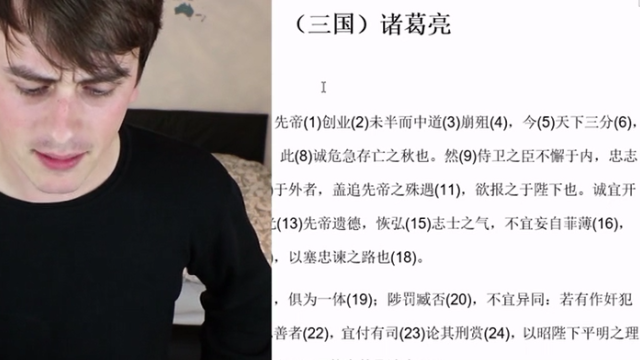囧研究:我们为什么觉得英国男人该死的性感
作者: Lauren Oyler
来源:VICE
2016-05-30 10:32
Last night a group of us were at a bar when we were accosted by the glowing appearance of a smiling, extremely good-looking man. He dazzled us with his sparkling blue eyes and sharp, inspiring jawline, and then he opened his mouth and revealed himself to be British.
昨天晚上,我们一群人在酒吧里遇到一位前来搭讪的帅哥,他热情洋溢,微笑迷人,英俊潇洒。我们都被他那明亮的蓝眼睛和棱角分明、鼓舞人心的下巴迷住了。后来,他一开口,我们就知道了,原来他是一位英国人。
We were beside ourselves. What is it about British men that makes women comfortable enough to openly giggle about them in their presence? The accent certainly plays a role—it softens them, making them seem sensitive and accessible. (Perhaps too sensitive and accessible.) But it is also probably something about that apologetic confidence; it's not the aggressive, in-your-face manliness the American people imbibe from a young age. And indeed, this week, the UK-based market research firm YouGov released statistics that confirm some of these romantic fantasies about British men: They increasingly think masculinity is bad and don't really associate themselves with it.
我们都沉醉其中。英国男人身上有什么特质使得女人们能非常舒服地在大庭广众之下对他们咯咯笑呢?口音肯定是一个原因——口音有柔化效果,让他们显得细腻而亲切(也许太细腻太亲切了)。但很可能也跟他们那种一脸歉然的自信有关;他们不像美国人从小就学着要有闯劲,要有直来直去的男子汉气概。事实上,英国市场研究公司YouGov本周公布了一些统计数据,揭示了英国男人谜之热辣的真相:越来越多的男人觉得“纯爷们”是个坏词,不希望跟这个词联系起来。
According to the statistics, which surveyed 819 men and 873 women, 42 percent of British men aged 18-24 have a negative association with masculinity. In older age groups, that percentage drops sharply. (So Hugh Grant is probably not among the more enlightened.) What's more, British men are much less attached to the concept of masculinity than American men; when asked to rate themselves on a scale from 0 (completely masculine) to 6 (completely feminine), 42 percent of American men considered themselves masculine, while only 28 percent of British guys did.
他们调查了819名男性和873名女性,数据显示,在18岁到24岁的英国男性中,有42%的人认为纯爷们是贬义词。在年龄稍大的人群中,这个比例下降了很多(所以休·格兰特很可能不在更为开明的那一组)。而且,与美国男人相比,英国男人更不愿意接受纯爷们这个概念。当要求他们用0~6为自己打分时(0代表纯爷们,6代表纯娘炮),42%的美国男人认为自己很爷们,而英国男人中只有28%的人这么认为。
Is there something about American culture and priorities that yield more masculine dudes? "It's intersectional as hell for me—but mainly because I really do identify as an American in terms of culture, as well as identifying as a man," said Harry Cheadle, a VICE US editor who identified himself as a 1 on the masculine-feminine scale. "There are more or less universal markers of masculinity, like being strong and sporty and relatively unemotional and not gay, but you see some national differences. UK men are definitely expected to dress better than American men. (I think?)"
那么是不是美国文化所看重的一些东西造就了更多美国爷们呢?VICE杂志的一位美国编辑哈里· 奇德尔说:“我对此无法苟同,但那主要是因为从文化角度来说我是美国人,而且我也认为自己够爷们。关于纯爷们,或多或少有一些普遍标准,比如要强壮,热爱运动,不那么情绪化,以及不搞基,但是国与国之间又有区别。比如大家往往觉得英国男人要比美国男人穿衣品味好,或者只是我这么认为?”他在“爷们-娘炮”量表中给自己打的分数是1分。
Another VICE UK editor outlined some further masculine archetypes. "There's definitely a very British set of masculine tropes/stereotypes," he, a 3, said. "Football-watching pub lad or Northern hard man who used to work in a mine or whatever. I fall more into the Blur era, Damon Albarn-y, artsy, soft, middle-class southern grouping than the Noel Gallagher, Northern hard man thing. Overall I fear people see me as more Hugh Grant—a bit wet and awkward." One of the sexier qualities of British men is how they speak English like it's a different language.
另外一位VICE杂志的英国编辑则更深入地指出了一些爷们的典型。这位给自己打了3分的编辑说:“我们有一种非常英式的纯爷们概念/刻板印象,比如在酒吧里看球的家伙或者在矿井里卖力工作的北方人之类的。我自己更接近Blur乐队的达蒙·奥尔本,是有点艺术家气质的、温和的南方中产阶级,而不是像诺尔·加拉格那样的北方硬汉。总的来说,我很怕别人认为我更像休·格兰特那种有点软弱又笨拙的人。英国男人更为性感的一点在于他们口中的英文就像另外一种语言。”
声明:本双语文章的中文翻译系沪江英语原创内容,转载请注明出处。中文翻译仅代表译者个人观点,仅供参考。如有不妥之处,欢迎指正。











